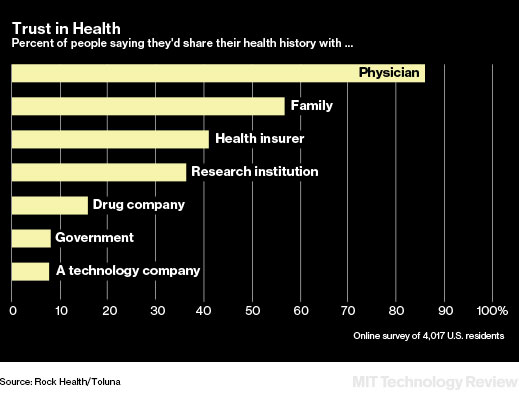Tech Companies Are Not Trusted with Health Data
The American public does not trust technology companies with personal health data, according to a survey from Rock Health, a venture capital firm focused on digital health.

Venture investors have poured record amounts into health apps, electronic medical records, and wearable devices, including $4.3 billion last year. But Silicon Valley’s touch with consumers hasn’t yet translated into many big successes.
Rock Health—which has invested in 13 startups this year, including the telemedicine company Doctor on Demand and Chrono Therapeutics, which makes a programmable nicotine replacement patch—decided to launch a large consumer survey to find out why. “A lot of digital health companies are struggling to sell to consumers, and we so we wanted to understand better what the state of adoption looked like,” says Teresa Wang, strategy manager with the investment company.
The survey, of 4,017 people, found that only 8 percent said they would share health data like medical records and lab results with “a technology company.” There was a huge gap between that figure and the number who said they would hand their health history over to a research institution (36 percent) or to their own doctor (86 percent). When asked whom they would share their DNA data with, the responses were similar.
Health care accounts for about 18 percent of U.S. GDP; it’s an immense market that tech companies and entrepreneurs in Silicon Valley see as rife with inefficiencies and ready to be disrupted. But health apps and websites aren’t going to get very far without consumers’ data. Wang says the industry relies on “data liquidity” but that most health data is trapped inside hospitals or insurance databases and can’t be exchanged freely.
“It’s not the tech companies that have the problem—it’s the health institutions,” she says. “If [we] can’t access health data because it’s siloed, then we have to go to the consumer.”
And that’s exactly where consumer preferences pose a roadblock. Digital health companies need consumers to hand over data, but so far they haven’t given people a convincing reason to share their blood pressure, genetic makeup, or health habits.
The survey, which was conducted online in July and August, also asked how willing consumers would be to share health data with specific tech companies. The contenders–Apple, Google, Facebook, Microsoft, and Samsung—all fared poorly, with approximately 5 percent of people saying they’d share with these companies. The outlier was Facebook, which people were about half as likely to give their data to. Only 2 percent said they’d share health or DNA data with the social network.
The trust gap may help explain why large tech companies have launched a growing number of partnerships with hospitals and medical institutions. This year, Apple launched ResearchKit, a way to help medical researchers collect data using iPhone apps. And this month Google Life Sciences entered into a $50 million project with the American Heart Association to study heart disease.
“Google and Apple are doing the smart thing; they need the trusted partner,” says Dennis Ausiello, a doctor and former chief of medicine at Massachusetts General Hospital, who this year helped create a diabetes app for the iPhone and also consults with Google. Ausiello doesn’t think only technology companies need to adapt. He says digital medicine won’t advance unless many, if not most, people begin to share and pool data for the common benefit. That will require “a social and cultural sea change,” he says.
Keep Reading
Most Popular
Large language models can do jaw-dropping things. But nobody knows exactly why.
And that's a problem. Figuring it out is one of the biggest scientific puzzles of our time and a crucial step towards controlling more powerful future models.
How scientists traced a mysterious covid case back to six toilets
When wastewater surveillance turns into a hunt for a single infected individual, the ethics get tricky.
The problem with plug-in hybrids? Their drivers.
Plug-in hybrids are often sold as a transition to EVs, but new data from Europe shows we’re still underestimating the emissions they produce.
Stay connected
Get the latest updates from
MIT Technology Review
Discover special offers, top stories, upcoming events, and more.